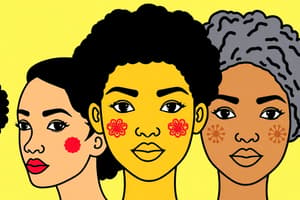Podcast
Questions and Answers
What is primarily identified as the basis for classifying people into racial groups?
What is primarily identified as the basis for classifying people into racial groups?
- Cultural practices
- National origins
- Religious beliefs
- Observable traits (correct)
Which of the following is NOT a characteristic of an ethnic group?
Which of the following is NOT a characteristic of an ethnic group?
- Observable physical traits (correct)
- Shared language
- Common culture
- Ancestral heritage
What percentage of Canadians reported belonging to a racialized group according to the 2021 Census?
What percentage of Canadians reported belonging to a racialized group according to the 2021 Census?
- 45%
- 25% (correct)
- 35%
- 15%
What does the Indian Act represent in the context of race?
What does the Indian Act represent in the context of race?
How is 'whiteness' commonly viewed in the context of societal constructs?
How is 'whiteness' commonly viewed in the context of societal constructs?
What defines discrimination in the context of social groups?
What defines discrimination in the context of social groups?
What is a primary consequence of racism according to functionalism?
What is a primary consequence of racism according to functionalism?
Which of the following best describes 'racialization'?
Which of the following best describes 'racialization'?
Which factor is not typically associated with the social determinants of health?
Which factor is not typically associated with the social determinants of health?
How does gender typically influence health behavior?
How does gender typically influence health behavior?
What is systematic racism?
What is systematic racism?
What impact does income inequality have on health outcomes?
What impact does income inequality have on health outcomes?
Which of these illustrates a common finding regarding indigenous populations?
Which of these illustrates a common finding regarding indigenous populations?
What does intersectionality address in the context of social inequality?
What does intersectionality address in the context of social inequality?
In the context of discrimination in hiring practices, what was a finding from the study conducted by Dechief and Orepolous?
In the context of discrimination in hiring practices, what was a finding from the study conducted by Dechief and Orepolous?
Flashcards
Race as a social construct
Race as a social construct
The idea that race is not a biological reality, but a concept created by society. It's fluid and changes over time and location.
Racialized group
Racialized group
A group of people who are classified by society as belonging to a particular race, often with associated disadvantages or inequalities.
Ethnicity
Ethnicity
Shared cultural characteristics, language, beliefs, and/or national origin of a group of people. It often overlaps with race but is distinct.
Racism
Racism
Signup and view all the flashcards
Indian Act
Indian Act
Signup and view all the flashcards
Prejudice
Prejudice
Signup and view all the flashcards
Stereotype
Stereotype
Signup and view all the flashcards
Discrimination
Discrimination
Signup and view all the flashcards
Racilization
Racilization
Signup and view all the flashcards
Social Determinants of Health
Social Determinants of Health
Signup and view all the flashcards
Income Inequality
Income Inequality
Signup and view all the flashcards
Indigenous Health
Indigenous Health
Signup and view all the flashcards
Intersectionality
Intersectionality
Signup and view all the flashcards
Functionalism (Sociology)
Functionalism (Sociology)
Signup and view all the flashcards
Study Notes
Race and Ethnicity
- Race is a label used to classify groups of people based on observable traits like physical attributes (skin color, eye shape), ancestry, social roles, behaviors, and attitudes.
- Ethnicity describes groups with shared cultural traits, including language, religion, and national origin.
- Ethnic groups often feel culturally and socially connected.
- The 2021 Canadian Census reported over 450 ethnic origins and almost 40% of Canadians reported more than one ethnic origin.
- Race is considered a social construct, meaning it's a concept created and defined by society, not biology; it is fluid and changes over time and space.
- The Indian Act, a piece of legislation in effect today, defines Indigenous peoples as a race.
Social Constructs
- Race is a social construct—genes and groups of genes are common to all people.
The Indian Act
- It's a piece of legislation defining Indigenous people as a race. This categorization has historically impacted Indigenous populations across Canada and the United States, creating systemic issues and reduced diverse nations.
Whiteness and Symbolic Representation
- Whiteness constructs people's lives by embodying symbols of dominance, normalcy, and privilege.
Racism
- Racism is a tool used to legitimize, control, dominate, and exploit racialized groups.
Prejudice and Stereotypes
- Prejudice is a negative attitude toward a group.
- Stereotypes are exaggerated generalizations about members of a group.
Discrimination
- Discrimination is acting on prejudiced views, leading to unequal treatment of groups. Examples include job discrimination, unequal pay, and denial of opportunities.
Racism (Prejudice + Power)
- Racism includes prejudice and discrimination, but is supported by power structures.
- It's systemic, meaning ingrained within society's systems and institutions.
Racialization
- Racialization is the process of assigning specific, often negative attributes to a group, leading to discrimination.
Sociological Approaches to Race (Functionalism)
- Functionalism views racism as dysfunctional, as it limits the use of societal resources and exacerbates social problems.
- Discrimination means societal resources are not maximized.
- Racism intensifies social issues like poverty and crime.
- Prejudice and discrimination negatively affect international relations.
Intersectionality
- Intersectionality acknowledges that various inequalities (of race, gender, class, etc.) combine to create unique experiences of oppression;
- These experiences can negatively impact health, happiness, and safety.
How Social Movements Impact Public Health
- Social movements bring awareness and change, impacting public health.
Studying That Suits You
Use AI to generate personalized quizzes and flashcards to suit your learning preferences.




